Reply To:
Name - Reply Comment
Last Updated : 2024-05-04 00:05:00
During an observation visit, Assistant District Director of the National Fertilizer Secretariat in Vavuniya, Bandula Wijewardana, said that if more programmes of this kind were organized, the national goals of transforming our agricultural practices could be realized soon
When we conducted sample tests we found that the nitrogen content exceeded one per cent, while the phosphorus and potassium were also at very good levels. We also found that the sand percentage was slightly higher than expected. But we were happy to find that they are now maintaining the required sand percentages as well as the levels of moisture
Officials explained that the price of fertilizer is determined according to the nitrogen value. According to the lab results, the fertilizer produced by the SLAF has higher values of nitrogen

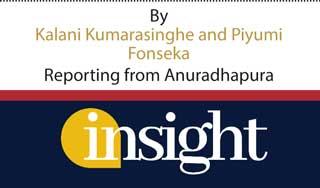
With the Government’s decision to ban chemical fertilizers in 2021, farmers have struggled, while some even delayed cultivation, until a certain solution was introduced to their newfound issues. Since the inorganic fertilizer ban, an approximate 30 per cent drop was recorded in seasonal yields, according to the Paddy Marketing Board (PMB). As complaints from farmers grew, the Cabinet of Ministers recently approved a 40 billion rupee package to compensate paddy farmers, who have been hit by the fertilizer ban.
While various State-sponsored projects are underway to assist crisis-hit farmers, the Sri Lanka Air Force (SLAF) embarked on a project to aid the ambitious national goal of providing access to a non-toxic and balanced diet for Sri Lankans.
On October 22, 2021, the Sri Lanka Air Force Organic Fertilizer Production Project was declared open by Commander of the Sri Lanka Air Force Air Marshal Sudarshana Pathirana.
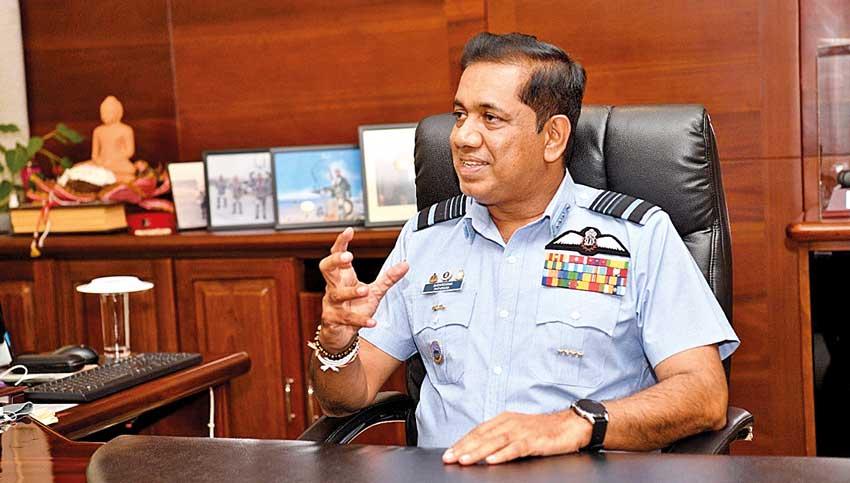
SLAF Commander Air Marshal Sudarshana Pathirana
The Daily Mirror visited the SLAF Regiment Training School in the Vanni, where the organic fertilizer project has shown promise in fulfilling the needs of cultivators in the region.
During an observation visit, Assistant District Director of the National Fertilizer Secretariat in Vavuniya, Bandula Wijewardana, said that if more programmes of this kind were organized, the national goals of transforming our agricultural practices could be realized soon.
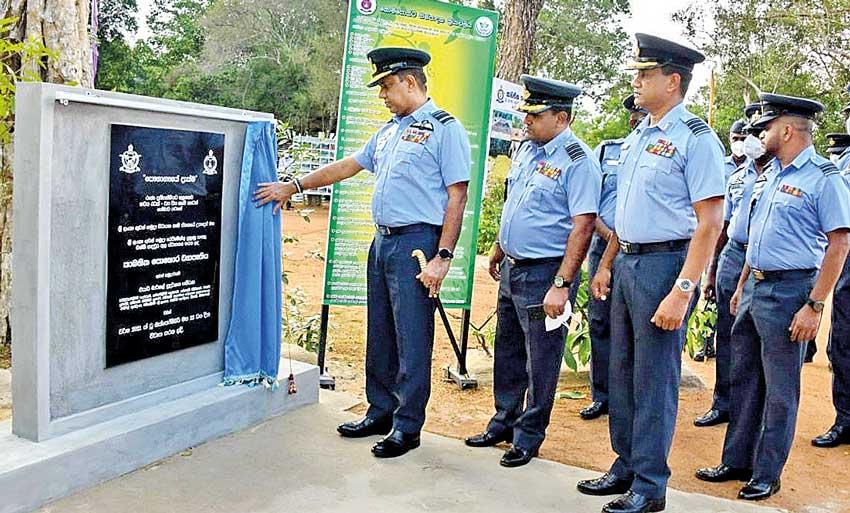
The organic fertilizer project was declared open in October 2021 by SLAF Commander Air Marshal Sudarshana Pathirana
“This project by the SLAF has made use of technology while implementing a process where human labour is at a minimum. Since the raw materials have been used efficiently, the goal of producing organic fertilizer within a short period of time has been successful,” Wijewardana said.
“When we conducted sample tests we found that the nitrogen content exceeded one per cent, while the phosphorus and potassium were also at very good levels. We also found that the sand percentage was slightly higher than expected. But we were happy to find that they are now maintaining the required sand percentages as well as the levels of moisture,” a Government official said.

“If they can produce more, it would be possible to supply the required amount of fertilizer to the entire Vanni District. As this fertilizer does not need any more quality checks, we can directly supply the fertilizer to the farmers,” he added.
The SLAF’s initial goal of producing 25 metric tonnes of fertilizer has been achieved under the first phase of this project.
“As the sample testing carried out by Lak Pohora had satisfactory results, there is no requirement for further testing. Thus far, we have been given 25 metric tonnes of organic fertilizer produced here.
“Over the next two weeks when the fertilizer is ready to be packed in bags, we expect to supply another stock for the Vavuniya District,” an official of the State-owned Lak Pohora (Ceylon Fertilizer Company Ltd.) said.
At present, the fertilizer produced at SLAF Vanni goes directly to be distributed under a Government subsidy scheme. The fertilizer is stored in Medawachchiya from where it is distributed to agrarian development centres.
“This project was implemented as a contribution to the national economy and under the leadership and guidance of the Air Force Commander. We have been able to produce fertilizer of high quality through this project. It must also be noted that the machinery needed for these large scale projects have also been designed and manufactured by the SLAF engineers.
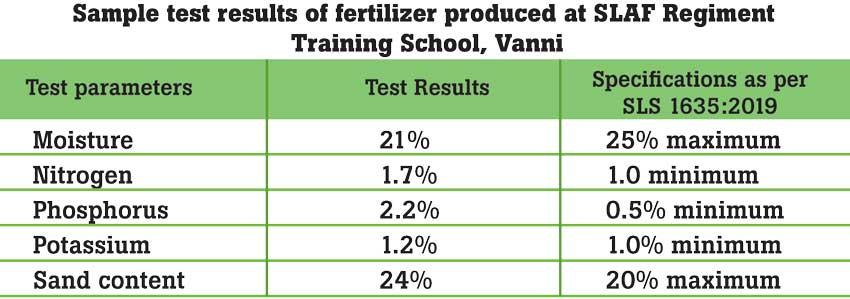

Not only did it improve efficiency, but also improved the quality of the fertilizer. Over the next few weeks we expect to supply around 75 metric tonnes of fertilizer through Lak Pohora
Group Captain Rajeev Kodippili
“Not only did it improve efficiency, but also improved the quality of the fertilizer. Over the next few weeks we expect to supply around 75 metric tonnes of fertilizer through Lak Pohora,” said Group Captain Rajeev Kodippili, Commander Agro Unit of SLAF.
Fertilizer with higher nitrogen value
A bulk of raw materials required for the production of fertilizer is sourced from the Air Force compound itself, we learned.
“Even the leaves we collect for this process are from the domestic areas within the camp, as we need to be careful of the organic content. The carbon-to-nitrogen ratio in these leaves is of a very high value, which means that it takes a longer time for it to decay. Therefore we add materials like poultry manure, cow dung and Gliricidia leaves and Eppawala rock phosphate to reduce the time it takes to decompose,” officials said.
“There are some materials where the carbon to nitrogen ratio is high. To balance this out we use the wastage from animal husbandry, which has lesser carbon-to-nitrogen ratios. The result of this is that the compost we create through this process has a higher nitrogen value than other compost manure,” they explained.
SLAF officers also explained why a person attempting to make fertilizer on their own would find the process to be expensive, as raw materials like poultry manure and cow dung are expensive.
“As the air force camps have these materials readily available, we have no difficulty in sourcing,” he said.
Poultry manure is priced at around Rs. 300 per 50 kgs. It is one of the raw materials which farmers find difficult to source, which is often a barrier to making their fertilizer.
In preparing the fertilizer, the first layer to be added is dry leaves. The layer has a thickness of about nine inches. Next is a six-inch layer of poultry manure, the officials demonstrated.
“At times we add a layer of straw, but that takes longer time to decompose, and its nitrogen content is also lesser. When we use banana stems, the potassium content is higher. So we keep adding these variations, and testing out different methods in our trials,” they said.
The entire process of decomposition takes between three to four months, according to the SLAF officers. But they explained that as the camp is situated in the dry zone, the decomposition rate is higher, making it possible for the production to become more efficient.
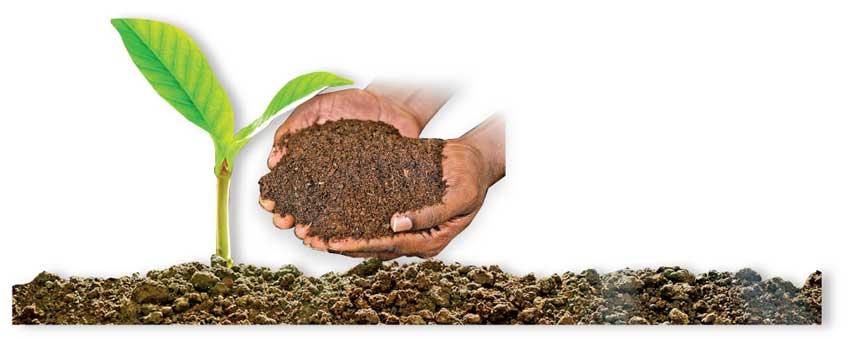
A special addition to the fertilizer produced here is the Eppawala rock phosphate which is added in a powder form.
“However we create compost from raw materials, phosphorus is not produced in this process of fermentation. Therefore it has to be an additional input. But the phosphate powder we get cannot be added as a growth aid to a crop, as it will take about 10 months for the crop to fully absorb the nutrient. That is why we add the powder to this fertilizer mix, which along with the bacterial reactions will help the crops to absorb the necessary content,” they explained.
Officials explained that the price of fertilizer is determined according to the nitrogen value. According to the lab results, the fertilizer produced by the SLAF has higher values of nitrogen.
The project officials said that in future they would attempt at various ratios to increase the nitrogen value, which will help fertilize a higher volume of crops.
“The product we have now is a balanced fertilizer which has nitrogen, phosphorus and potassium.
“But if the nitrogen value can be increased with inputs such as pigsty manure, that will help the fertilizer to be applied to larger areas of crops,” they said explaining the possibilities of future trials.
Tavisha Udupihille Thursday, 03 March 2022 02:18 PM
How can it be organic if rock phosphate is used

Add comment
Comments will be edited (grammar, spelling and slang) and authorized at the discretion of Daily Mirror online. The website also has the right not to publish selected comments.
Reply To:
Name - Reply Comment
US authorities are currently reviewing the manifest of every cargo aboard MV
On March 26, a couple arriving from Thailand was arrested with 88 live animal
According to villagers from Naula-Moragolla out of 105 families 80 can afford
Is the situation in Sri Lanka so grim that locals harbour hope that they coul

8 hours ago